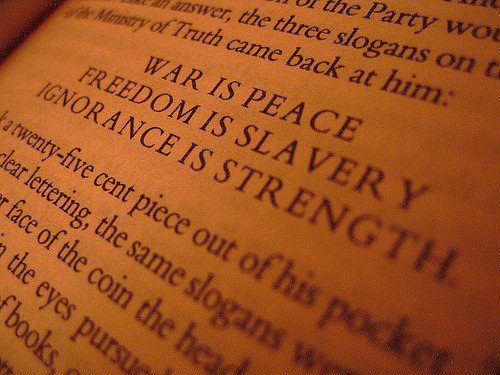War Is Peace, Freedom Is Slavery, Ignorance Is Strength

The State would have you believe that its definitions of reality are the truth. It has twisted our minds so much, that things that we think of as “common sense”, when looked at objectively are stunning in their fallacy.
I’m going to talk about regulations today. When we go back to events such as the BP oil spill last year, the common outcry is for the government to “do something” about these businesses that run amok. Most often that “do something” includes making more regulations. If you ask most people the simple question of “do government regulations make businesses more accountable, or less accountable?” the answer is “more accountable!” (often said with a sigh, or eye rolling, to indicate that you’re a simpleton for even asking such an obvious question).
And yet, I do ask the question. Does government regulation make business more accountable? I find the answer to be interesting, if one takes the time to really think the logic through. This particular question comes up often in statist arguments as to why we need the State. They proudly pull this argument out of their pocket, and flourish it about, deafly tuning out any answers you may come up with, because clearly you can’t answer this question. They’ve got you. Common sense says that they’re right. Common sense says that businesses are evil, and will do only that which they are forced to do.
Common sense is wrong. And I can prove it. I’m going to use an example of how the State has lowered standards for an industry through strict regulations. We should begin by looking at buildings built in the 1700’s and 1800’s. I can do this pretty easily, as there are farmhouses and city buildings dating back to the 1800’s all around me here in southwestern Ohio. If you want to look at buildings built in the 1700’s, you must travel further east, to New York, Boston, and Virginia. This argument is bolstered further by looking at buildings and structures in Europe, father back in history. But we’ll stick with homes built in the 1800’s.

These homes are sturdy. Built with brick, and large beams. These homes stand the test of time. They have wide, sweeping patios and scrollwork on the siding. They are built solidly, and have intricate design work. They are marvels of form and function. And they had no “code” to be built to.
Contrast them to homes built today. I had a boyfriend a while ago who was an electrician and contractor. He would laugh anytime someone asked him if he would rather buy a new home or an old home. He would say, “I’ve seen how they build new homes. I’d never buy one of those pieces of junk.” New homes are built to a government mandated code. This is not a good thing.
If there is no enforced code, then contractors set the code. As a consumer, you decide how much you want to pay, and what you want to get for your money. If contractor Bob has a reputation for doing lackluster work, then you might want to choose contractor Dave, who has a reputation for being more competent. As a consumer, you are free to choose. If you want a long-standing building, you are free to choose contractor Dave, but if you are looking for something cheap and that only has to last a season or two, you can feel free to choose contractor Bob. Regardless, your building will be built to your code, not the code of a government.
However, freedom aside, enforced regulations don’t just make the poor contractor raise his standard (and prices). It doesn’t just affect whether your shed now has to be built to standards ridiculously high for it’s purpose, but it also makes contractor Dave lower his standards. He doesn’t have to work to the highest level now. He only has to do the minimum to pass code. Consumers will want their product to be “up to code” without realizing that “to code” is the MINIMUM. So now, instead of choosing contractor Dave, whose work is above code, they choose contractor Bob, whose work is “up to code” because contractor Bob is cheaper, and “up to code” means it’s safe, right?
So now contractor Dave has to lower his standards to compete with contractor Bob. Instead of using the best products and having a higher price, he now also goes just to code, and prices competitively to Bob. So now we have Dave, the former good contractor, lowering his standards, and Bob, the former bad contractor, raising his standards. Right? Not quite.
See, contractor Bob is never going to be a better contractor. Forcing him to work “to code” is just giving him a minimum he can work to. All he has to do is pass inspection. And that’s pretty easy to do. It also gives him legal protection. If his shoddy work falls apart in two years it’s not his fault, he made it to code.
Having government regulations does not raise business practices. It helps shoddy businesses, while punishing businesses that would have normally had high standards. If you want to have a business strive for greatness, remove the minimum requirements. That puts the accountability back onto the business and the consumer, and out of the government’s hands.
Ki Vick
2011

Well said! Good job on the clarity of your writing and even more so on your logical argumentation. Thank you for sharing your thought process with us all, I hope from this that many will learn a thing or two about the of common sense and start taking it with a grain of salt.
The process you have described seems to find application at many levels of our governments and its applications widespread thus lowering the quality of public services, its bureaucracy, education and so on while applying more and more "standards" to which we are supposedly in the mandatory position of following.
The rise of the bureaucracy in our different levels of governments, enforced by the judicial system as well the increasing pressure coming from our financial and banking institution in following the lower denominator brought forth by the codes surely encourages one to follow this sadly to the tee.
Thanks again for such a good write up, keep on taking good care and educating us as your presence is valued and valuable to all. All for one and one for all! Namaste :)
Nice post. My dad was a carpenter who put a lot of pride into his work. In the later stages of his life (died of cancer) her made custom furniture to design, and he would occasionally do fancy scrollwork carpentry by clients approaching him asking him to do so. He had a reputation for very high quality. He loved old things and buildings, he would even restore some. He also collected hand tools and would often make furniture just using old hand tools. I believe he would have agreed with you.
EDIT: Resteemed
I just did a google search, didn't even realize that place had changed its name. I couldn't find a view of what I thought was really cool there. He had hand carved wooden pinecones as parts of the decoration in that place.
This is a really great post and you nailed a few points. Do we need regulations from untrusted governments to be considered as an accountable business ? I don't think so ! Who's common sense we follow is the real question.
The market process finds solutions. Perhaps lending institutions, insurance companies, contractors, etc. would outsource home inspections to independent auditors. Market demand would reward quality. Sound money and a lack of tax burden would decrease the cost of better products. Freedom is the solution.
I will propose your article in steemit.chat
Freedom IS THE Solution indeed ! A reward system the better way to go.
Yes, we see how that works in countless examples....
Wait, is there ONE example how the not-existance of rules actually saved peoples live?
I only know examples where governmental rules saved lifes. Fire regulations. Worker protection laws. Earthquake building codes (which are mainly enacted AFTER a big earthquake destroyed all the "free" build houses).
@lennstar I understand your valid points but I don't see government nor politicians fix any problems. Who really implements and follows up on their rules? Look at the Oakland warehouse fire case and their idiotic rules didn't safe those 36 precious lives either. Communities should be more responsible and take care of each other. Nobody of those politicians came to help the housing problem artists faced. Once again , I believe to give more freedom and true support is the solution, taking responsibility for safety among ourselves That's what I believe is much more important than those codes and sometimes senseless laws.
I agree with them as guidelines of course.
PS : I hope my English is good enough to express what I mean.
I have no idea what happened in Oakland. Anyway, you are under a misconception.
Don't throw government, politicians and communities together. This post was about government. There are governments without politicians (often called communities), who nevertheless use some sort of politics.
Maybe you should look into "commons" in the Elinor Ostrom sense?
good post
This is a really good post with a great example!
We've already got a lot of notes taken, but I've put this on the @steemittalk podcast agenda to try and talk about if time permits.
Don't forget that most of the codes are actually not "governmental" but "local interest group" codes.
Like "keep the poor - especially blacks - out of my neighborhood" codes.
But that is not governmental problem but a problem of people discriminating others - you don't need a government for that. It just moves the responsibility away from you if you have "governmental" things, so you don't need to have bad feeling about being an asshole.
here for example about zoning laws:
http://urbankchoze.blogspot.de/2014/04/euclidian-zoning.html
You need government to make prejudice into "law" though.
You don't need a government to make prejudice into a rule though.
Your sentence does not make sense, since laws are by definition enacted by governments. No government, no law.
If I would say "you need water to make a river" it would be the same. Correct sentence but without meaning.
The arbitrary dictates of politicians are not "laws" in any rational sense.
http://bastiat.org/en/the_law.html
https://mises.org/library/how-have-law-without-legislation
Sorry, law is by definition something enacted by - haha - the lawmakers, aka the legislature aka politicians.
There may be other "stuff", but that is not law. You may use the word law for it to confuse other people, and the definition of law may even change to it, but it still is not.
Saying the sky is yellow does not make it yellow.
Quite the contrary. "Law" is applied to many other things, and legislators use language to trick the gullible into thinking their arbitrary scribblings carry some kind of weight. Natural law trumps politics.
I agree as far as your article goes. The codes are basically a bribe paid to the local gang. Your article doesn't go very far beyond that.
What about the quality of all non-superficial things in the house? - the things that are difficult to test for. These are things like the quality of wires/junctions inside walls, the framing, the chemistry of concrete, etc. Everything would be sold 'as-is' I think most things sold 'as-is' sell for a fraction of warranted items, usually half or less. I suppose in such a market, a business would arise that guarantees various aspects of the item.
What about the class of aspects that impact others? Is putting lead paint in it ok if I'm not going to live in it? How about a sewer system that taints the local water supply long after I am dead? Is it ok to put up a structure that may blow into a neighbors house?
Not very satisfying answers to those issues.
You mention some possible solutions in your comment. Independent certification does not require a government monopoly, and in fact cannot be provided well by a monopoly in the first place.
Makes sense.
Not everything is so simple as your arguments make it seem.
It is precisely because life is complex that governmental solutions cannot address them. Nothing is more foolishly simplistic than saying politicians can fix a given problem.
Nothing is more foolishly simplistic than thinking they can play no role. A Government is just a collection of people, it is inherently no more able or unable to assist in correction of a situation then any other large organization. Massive Bureaucracy is slow, and prone to corruption but not entirely incapable of addressing issues. There is a potential utility for all things, including things undesirable or even evil.
A government is a group of people who claim a territorial monopoly in violence and fund everything they do through extortion. Its bureaucrats are primarily concerned with gaining and retaining power, not with serving the populace. The incentives of public choice economics guarantee corruption, waste, and abuse. Evil and destructive means cannot produce a net good and constructive end.
Not necessarily.
Not necessarily.
Ugh, no.
I like to think I do a fine job at producing a net good and constructive end, thank you very much.
I don't particularly wish to spend the energy arguing with you over your points (as it wouldn't be constructive for either party).
The territorial monopoly in violence definition is according to mainstream political science. Taxation is extortion under color of law, since a unilateral demand backed by threat of violence remains the same regardless of the fancy documents signed by politicians. So yes, that part is necessarily true.
Public choice economics cannot be hand-waved away, and its consequences of incentives for politicians cannot be disregarded. There are ample psychological studies showing the effects of power in support of such analysis. My friend Davi Barker covered this thoroughly in his articles and book. There is also an audiobook torrent available for free download.
Your opinion is not evidence supporting a rational argument.